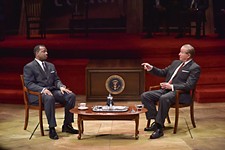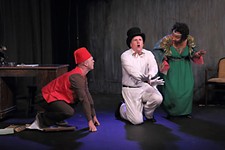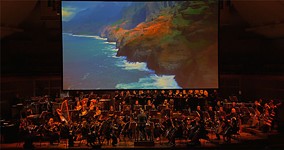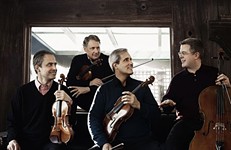Dangerous Corner
Local Arts Reviews
Reviewed by Robi Polgar, Fri., July 6, 2001

Dangerous Corner: Dreadful Import
The Off Center,
through July 21
Running Time: 2 hrs, 15 min
Different Stages tends to take it easy over the summer season, producing plays less intellectually strenuous and more theatrical and fun: the theatre's answer to a good, cheap novel thrown into that canvas beach bag along with a towel, some lotion, and a pair of sunglasses. Mysteries prevail, for example, George M. Cohan's Seven Keys to Baldpate, Reginald Denham's Ladies in Retirement, and Agatha Christie's Black Coffee. Last summer, the company got a theatrical sunburn with an uninspired production of the George Kaufman-Marc Connelly satire of the early movie-making business Merton of the Movies, which was cute at best, but so disconnected from anything topical as to completely miss the satire, and therefore the comedy. And although this summer sees a return to the mystery genre, J. B. Priestly's Dangerous Corner is as disconnected as Merton, and even less fun. It is unmysterious, uninteresting, and unsatisfying.
This production of Priestley's 1932 script sounds flat and melodramatic, although it was supposedly a comedy in its day. The characters are unworthy of sympathy: remote, cruel, stubborn, and often glaringly stupid for such intellectually acute people. Mostly unrecognizable, this lot are members of the pre-World War II English upper middle class who live in the world of country cottages, city offices, detached emotions and stiff upper lips, dashed unsporting behavior, and rhetorical gamesmanship. The characters all seem to loathe one another, and themselves. This dysfunctional collection is supposed to be a group of lifelong friends, yet they haven't a clue about each other. The script tosses expositional firecrackers right, left, and center, leading to some of the worst possible stage moments as actors turn sharply, eyes popping and mouths open, to exclaim, mortified, things akin to "But how could you have known the cigarette holder arrived that very afternoon?" and "But Betty, what makes you say something like that now?" as the group gets down to unraveling the mystery of some missing money, a long-dead brother, and the extraordinarily obvious "discoveries" of which of them are lovers or in unrequited love with other members of the dismal group.
Director Karen Carver Sneed has little to work with textually that is remotely interesting and so has to find drama in moving the cast about the stage. But this leads to a predictable rhythm of actors getting up and crossing whenever they have something of dreadful import to declare, which leads to an onstage game of musical chairs as each character makes his weighty statement having crossed to take the position of the character whose desperate and matterful utterance has taken her to the previous speaker's former position, and so on. The upstage drinks cabinet is drained by the play's end as part of this ritual of exposition, yet only Joel Citty, as the dead man's brother and evening's host, appears affected physiologically and psychologically by the combination of booze and awkward revelation. The play's conclusion sets up the night's only bit of psycho-thriller theatricality, which, while rather clever in comparison, leaves as permanent a mark as footsteps in the surf.










